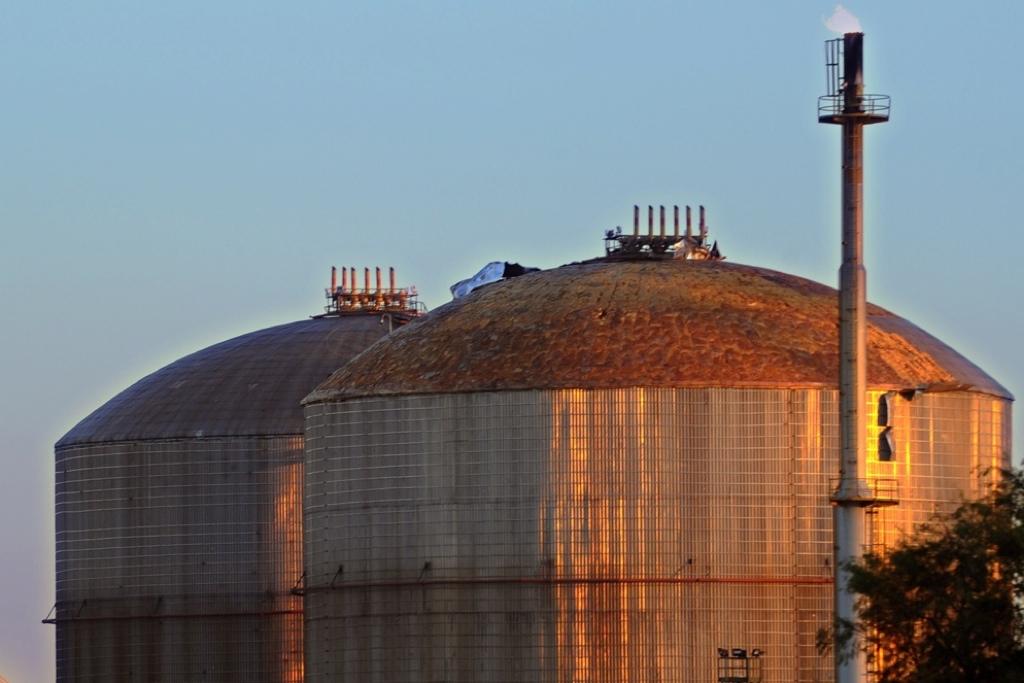Argentina’s oil grab: crude or shrewd?
View at sunset of the YPF gas plant in Buenos Aires, Argentina.
Editor's note: The idea for this article was suggested by a GlobalPost member. What do you think we should cover? Become a member today to suggest and vote on story ideas.
HAVANA, Cuba — For economists and editorial writers in Europe and North America, Argentine President Cristina Fernandez de Kirchner’s decision this month to nationalize a controlling stake of the country’s largest foreign oil company was a hasty, ill-conceived act — tantamount to “theft,” in the words of the Wall Street Journal.
The seizure of 51 percent of YPF shares from Spanish energy giant Repsol brought gushing scorn on Fernandez’s government, along with talk of trade retaliations from the European Union and threats of capital flight from Buenos Aires banks.
Drill down a bit deeper though, and the decision looks to be a clear political winner for Fernandez — with the possibility that it may turn out to be a shrewd economic move too.
After all, Argentina was recently discovered to be floating atop a vast pool of money: the third-largest reserves of shale gas and oil in the world, after the US and China. If Argentina can attract enough investment to get it out of the ground — a big if — that means more energy and bigger earnings could go to national development, rather than foreign shareholders.
More from GlobalPost: Argentina's yerba mate crunch
The expropriation decision has been heartily cheered at home, even by Fernandez’s political rivals, as the Argentine Senate voted 63 to 3 Thursday to support her nationalization plan. The lower house is widely expected to pass the bill next week.
While it has become an article of faith among many northern-latitude economists that oil production is always best left to the private sector, that’s not the way most of the world’s energy is produced — and certainly not in Latin America.
Fernandez hit that point hard when she announced the nationalization plan. “We are the only country in Latin America, and I would say in practically the entire world, that doesn't manage its own natural resources," she said.
Voters in Latin American don’t like the idea of foreign oil companies getting rich off the hydrocarbons under their feet, even if state oil companies often struggle with bureaucratic bloat and production inefficiencies.
With oil at $100 a barrel and Asia’s energy-hungry economies keeping demand high, it may be simply politically untenable in the region to keep the pricey black stuff in private hands.
Latin American governments have used their state-owned energy companies in recent years to shield consumers from some of the price spikes, while leveraging oil exports as a way to fund improvements in health care, education and social programs. These soften the inequalities that persist even as their economies — like Argentina’s — enjoy robust growth as a result of high commodity prices.
More from GlobalPost: The Argentine economy's fuzzy math problem
In Mexico, efforts to privatize the state oil monopoly Pemex have gone nowhere, and price controls mean that US residents along the border have been driving into Mexico to fill up lately — even when the pumps are in some of the world’s most dangerous cities.
Brazil energy titan Petrobras, the largest corporation in Latin America, is often cited as a model of public-private hybridism, open to private investment but ultimately still under Brazilian government control.
Argentina’s President Fernandez said that’s the model she wants to adopt. YPF was a state company until it was privatized during the economic crisis of the 1990s, and in recent years the company has struggled to meet the growing energy needs of the Argentine economy, which expanded at more than 9 percent in 2010 and 2011.
Despite its huge stores of oil and gas, the country has been spending $10 billion annually to import gas from as far away as Qatar.
Repsol defenders blame Argentine government price controls and other burdensome regulations for exacerbating the shortages. Fernandez and other officials say Repsol was milking YPF to pay out big dividends to shareholders when it should have been drilling Patagonian shale beds instead.
Now the challenge will be for Argentina to raise enough capital to develop those resources. Though the nationalization effort may scare off private oil companies, the state firms of friendly governments like Petrobras and Venezuela’s PDVSA may step in to help tap Argentina’s abundant supplies.
More from GlobalPost: UK investors see profit in Falklands despite row with Argentina
Petrobras said it plans to invest $500 million into Argentina this year. While Buenos Aires may end up facing a $10 billion court-ordered compensation to Respol, the matter may be tied up in litigation for years.
Certainly, relations with Europe have been strained by the expropriation of YPF — and Fernandez’s whipped-up nationalism over the British-controlled Falkland Islands — but it’s telling that much of Latin America seems to be standing with Argentina.
Left-leaning governments in the region applaud the move for the politics of it, even as they could face new skepticism as foreign investors wary of more nationalization moves as commodity prices climb higher.
For free-market stalwarts like Mexican President Felipe Calderon, it’s a chance to show how their economies are not like Argentina’s. “We all need investment and nobody in their right mind invests in a country that expropriates investments,” Calderon said of Argentina’s move, at the World Economic Forum’s Latin America meeting.
“We must defeat protectionist temptations,” he said to rounding applause. “We need more foreign investment, not less.”
